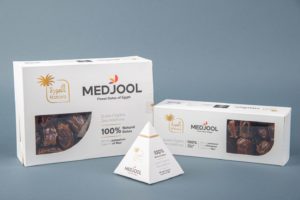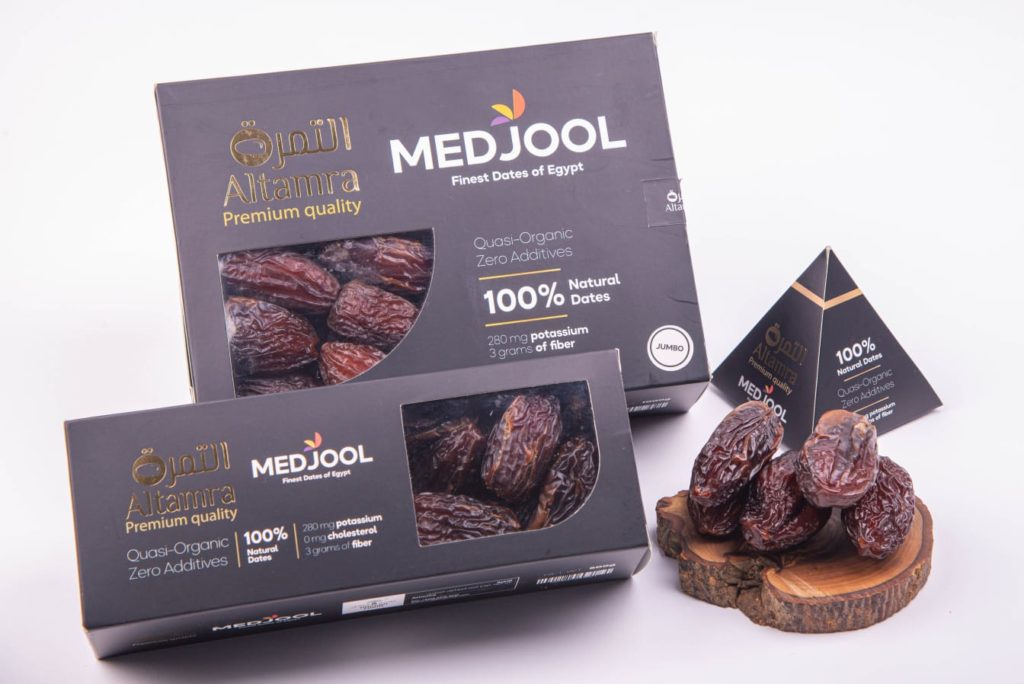Cairo – As part of its plans to expand the business and ship its dates to new markets, Egypt’s Haggan Group intends to export ten containers this year, with an average of 20 tonnes per container. The destinations could be many, and there is an expectation of selling to Brazil.
Engineer Khaled El-Haggan, Board chairman of Haggan Group, informed his company intends to establish a sorting and packaging plant with the most up-to-date technological resources available, unprecedented in Egypt.
The company seeks to secure the necessary financial conditions for constructing this facility through investors or financing to implement it soon. The cost is estimated at around EGP 200 million (about USD 6.66 million at the current rate).

El-Haggan explained, in an interview with ANBA, that the company has a farm with a planting area of 41 hectares and an adjacent area of approximately 21 hectares, part of the company’s production center. The company produces medjool and barhi variety dates, mangoes, and prickly pears. The Haggan Group also imports high-quality palm seedlings from a French company to cultivate or sell on the local market to other companies.
According to the businessman, the company exports around half of its production and partners with other companies in Egypt to buy their high-quality products and ship them to foreign markets. The company seeks to expand its exports to markets like England, Eastern and Western European countries, such as Germany, and also Russia, China, Australia, Japan, Brazil, and other countries in Latin America.
El-Haggan revealed in addition to exporting around ten containers in the current year; the company is preparing to increase overseas sales to 20 to 25 containers in the following year. The weight of each container varies between 18 and 20 tonnes, depending on packaging and storage.
Egypt improved its export environment
As chairman of the Dates and Palms Committee of the Agricultural Export Council (AEC) of Egypt, engineer Khaled El-Haggan said the management of the date and palm sector in Egypt has started to take an approach different from the past. This transformation began with developing and cultivating varieties with greater demand in overseas markets.
According to him, Egypt produces 1.8 million tonnes of dates yearly but ranks 12th in exports, with a share under 50,000 tonnes. The country, however, began to take the necessary steps to increase the export volume, giving attention to the quality of the cultivated products, conservation, packaging, and export logistics.
El-Haggan explained the AEC has worked over the last period to design a climate map through which farmers can identify the best spots to grow each variety separately. This indicative map will be presented to farmers to help them increase their productivity.
“Egypt has 26 different varieties of dates that produce three quality grades,” he said. The council identified each variety of date with complete data, storage methods, transport, format, sizes, and sugar levels, allowing farmers to determine the methods of cultivation and export.
Concerning supporting farmers to export, he emphasized the council is assessing the needs of different potential markets. The study began in ten different markets, taking into account aspects Egyptian businesspeople need to know about the countries, from the advantages of the Egyptian product in terms of price, competition, and required packaging standards, among others.
Regarding the most important markets for Egyptian companies, he explained all European countries remain targets for Egyptian exports. Egypt exports its products to East Asian countries and intends to focus on China, Japan, Australia, Russia, Canada, and Brazil in the next period, mainly because they are large markets with high purchasing power.
Arab Brazilian Chamber membership

El-Haggan claims the Brazilian market is promising for Egyptian dates. The company became a member of the Arab Brazilian Chamber of Commerce (ABCC) to explore existing export opportunities in the Latin American market, particularly Brazil. The company will have a booth at the APAS Show in Brazil, to take place next May, and will also participate in the Fruit Logistica show in Germany in mid-February.
Despite Egypt’s distance from Brazil, the businessman mentioned Medjool dates could be sold to Latin America, as they can be stored at temperatures from -18°C to 5°C. According to him, distance is always an issue with fresh varieties, such as barhi. In this case, quantities must be agreed upon in advance so specific cultivation methods can be adopted to help extend the shelf life of the dates to a period of between one month and five weeks, during which they remain fresh.
Regarding the strength of the Brazilian market, El-Haggan stated the presence of a sizeable Arab community contributes to the growth of date exports to the country. He explained that the discovery of dates’ benefits helped increase widespread interest in their consumption, regardless of religion or nationality. He highlighted this feature had become one of the aspects the council has been exploring in its promotion activities.
Translated by Georgette Merkhan & Elúsio Brasileiro




